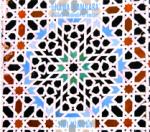

Part recorded in the studio part live, Gnawa Bambara features a number of tracks choosen from a vast repertoire and provides an opportunity for an authentic encounter with one of the most interesting and culturally and spiritually fertile north African traditions. Hailing from Casablanca, the Sidi Mimoun are one of the most important and esteemed brotherhoods in Morocco. Descended from black slaves deported from sub-Saharan West African countries such as Mauritania, Senegal, Mali and Guinea they continue to perpetuate an ancient, deelpy rooted tradition born from the union of their ancestral practices with Islam’s most esoteric branch, Sufism. Founded on music and dance their rites and liturgy have what might be called therapeutic aims, serving to reintegrate and rebalance the human body’s fundamental energies while at the same time reconciling and allying them with the spirits of possession through ascension to a plane of mystical ecstasy. As well as being a longstanding object of anthropological and ethno-musicological study, the Gnawa’s trance music has often attracted the interest of Western musicians (Berlin group Dissidenten and Bill Laswell are just two of the names who have borrowed from the Gnawas whose sounds can be heard on dozens of electronic and dance music records) on account of its infectious rhythmic circularity. Master of ceremonies for this CD is Abdenbi El Gadari, who plays g’mbri (a kind of drum-cum-lute) and t’bel (a big double skinned drum), accompanied here by five other dancer-musicians who make use of voice and qaraqeb (metal castanets) to reach trance state. A virtuoso of his instruments El Gadari and his group manage, even without visuals to effortlessly convey the vibrancy of their vertiginous rhythms. The singularity and liberating power of the Gnawas’ music takes us once gain on an ecstatic journey through the night to spiritual rebirth in a new dawn.
Trad Gnawan music, loud and clear
Given its popularity, good recordings of Gnawa music are surprisingly few and far between. This is basically because the traditional ensemble of guenbri (lute), krakesh (metal castanets) and tabl (drum) is very hard to balance. When you hear it live, your brain tends to rebalance things by focusing on the sound of the guenbri, but in recordings the clatter of the krakesh often drowns everything else. This recording, however, is one of those rare few that works, and Abdenbi El Gadari (mallem is an honorific meaning ‘master’) – born in Marrakech and now resident in Casablanca – shows himself to be truly a master of the guenbri. He plays with a sonorous muscularity and the guenbri’s deep sinewy melody drives this music.
El Gadari is the lead vocalist, backed by five chorus singers, but several of the tracks are largely instrumental, like ‘Guingouba’, about a black slave demanding his freedom, reflecting the Gnawa origins in sub-Saharan Africa. Some of the tracks here, and the title of the CD, trace the Gnawa’s ancestry to the Bambara of Mali and certainly the pentatonic melodies seem to support that link. The Gnawa are most famous for their night-time lila rituals, which combine healing and spirit possession, although it’s not clear how much of this repertoire would be used in that context. There’s an inevitable similarity between many of the tracks, but this is nonetheless an impressive recording of traditional Gnawa music.
Simon Broughton / Songlines # 40

Abdenbi El Gadar - guinbri, t’bel, lead vocal
Ahmed Ghani - qaraqeb, backvocal
Amina Ahmer - backvocal
Abdellatif Oughassal - qaraqeb, backvocal,
Hassan Sansi - qaraqeb, backvocal
Badr El Harnat - qaraqeb, backvocal

























